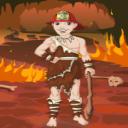Yahoo Answers is shutting down on May 4th, 2021 (Eastern Time) and beginning April 20th, 2021 (Eastern Time) the Yahoo Answers website will be in read-only mode. There will be no changes to other Yahoo properties or services, or your Yahoo account. You can find more information about the Yahoo Answers shutdown and how to download your data on this help page.
Trending News
Could we stop a massive asteroid from hitting the Earth?
Do we currently have the technology to stop a massive asteroid from colliding with the Earth if we were to spot it in time, and how much time would that need to be? Could we at least lessen the impact?
9 Answers
- Anonymous1 decade agoFavorite Answer
No, but several groups around the world are working on ways to deflect or destroy an asteroid on a collision course with Earth.
If an asteroid of sufficient size (estimates are around strikes the Earth, it will cause global devastation.
Small objects are hitting the earth all the time. Statistics show that:
- asteroids 1 km in diameter hit Earth every 500,000 years on average
- asteroids 5 km in diameter hit Earth every ten million years on average
- asteroids 5 -10 meters in diameter hit Earth's atmosphere about once a year (with about the same amount of energy as the Hiroshima bomb) - they usually explode in the upper atmosphere, and most or all of the solids are vaporized
- objects over 50 meters hit Earth about once every thousand years, producing explosions comparable to the one observed at Tunguska in 1908
No asteroids are known to be on a collision course at this time - the only one of concern right now is 99942 Apophis, but it has a 1 in 45,000 chance of hitting us and that's not until 2036.
By then, technology will have advanced enough to have found ways to protect us.
- Anonymous1 decade ago
That depends upon what you call massive. If we find one big enough to wipe out a large metropolitan area or a small nation decades ahead of time, the answer is yes. If we find one as big or bigger than the one that killed off the dinosaurs, that is a another story. I don't know if an object that large and massive could be prevented from striking the Earth. If found a century or longer ahead of time, there would at least be time to find out what it's made of and what is the best way to deflect it off it's collision course with Earth, if it can be deflected. If we find an asteroid on a collision course with us a year ahead of time, there's no stopping it. We wouldn't have the time to respond to the threat other than perhaps blowing it up, and that can easily turn one larger asteroid into an even deadlier swarm of little asteroids. And it would take a year or more to build a spacecraft to carry one or more multi-megaton thermonuclear bombs, let alone a rocket that can send it to the asteroid. The fragments could then treat the Earth to a shotgun blast of impacts, or the rocket could malfunction and trigger a global nuclear war if it falls to Earth and detonates. That is one reason why nuclear weapons are not based in space. That would be far worse than one large asteroid striking the Earth. The only things we could do is stockpile food, medicines and other supplies, build shelters and try to get as many people away from the spot the asteroid will strike the Earth as possible. Then hunker down and pray for the best. There are a number of asteroids that are a definite potential hazard to us, but none that are definitively known to be on an collision course with us. The sooner all the threatening asteroids are found, the sooner we can defend ourselves from them. All of this however still leaves out another threat about which we can do nothing, rogue comets. If one has our name on it, by the time we see it coming, it's far too late for us to stop it. All we could do is build shelters, stockpile food and medicines and pray.
- suittiLv 71 decade ago
Technology is an interesting concept. There's certainly no new physics that are required.
Currently we can spot asteroids with telescopes, and figure out where they are and where they are going. We have rockets that could be used to intercept asteroids. We have nuclear bombs that could be detonated on or near an asteroid. But this hasn't been done, and it isn't at all clear if this would do what we want. It might just shatter the asteroid, and we'd have many strikes instead of just one.
What we really need to do is deflect the beast. One way to do that is to launch a giant mirror, park it near the asteroid, and focus the light of the Sun onto a small area. This could vaporize material of the asteroid providing thrust to change the course of the beast. The mirror wouldn't have to be very good - so an inflatable mirror could be used.
But this technology hasn't been tested. So what we need to do is test it. I'd put a transponder on an asteroid so that it could be tracked extremely accurately. Then i'd test the mirror idea. Of course, i'd use an asteroid that isn't currently on course for Earth, or even very nearby.
It might take a couple years to change the course enough to miss the Earth.
The dinosaurs went extinct because they didn't have a sufficiently advanced space program.
- Anonymous1 decade ago
The farther an asteroid is from earth, the easier it would be to deflect it, since a small deflection will be magnified the farter it travels. The farther it is, however, the harder it will be to tell if it's on a collision course. We don't have the ability to precisely measure the path of asteroids that are only a few months away, and by the time it gets close enough to know for sure, not even a large nuclear bomb would be able to deflect it very much. Furthermore, our nuclear ICBM's can only attain sub-orbital flight paths. We would need to prepare some other type of rocket, like an Atlas booster, with a nuke.
- How do you think about the answers? You can sign in to vote the answer.
- FaessonLv 71 decade ago
why, do you see one coming?
really now... the Earth does fine on its own. If we do happen upon a "Wormwood" or something, then we may have to come up with an idea.
its really unlikely.
you dying in a car accident is THOUSANDS of times more likely than hitting the Lotto, and MILLIONS of times more likely than any astronomical incident.
buckle your seat belt!
- 1 decade ago
Dude!
Haven't you seen Armageddon?
We will just sent s couple of oilworkers up there in some fighter jet styled space ships to plant a bomb on it and blow it the crap up!
- 1 decade ago
if worse comes to worst, more than likely they would just load the thing up and blow it with explosives so the pieces would be smaller.
- Anonymous1 decade ago
Nuke, bomb it anything that will cause a huge explosion will do :D
- Israel-1Lv 61 decade ago
Could probably stop some...............but, won't be able to stop " Wormwood ".
Source(s): Revelation 8:8 - 11 ...... And the second angel sounded, and as it were a great mountain burning with fire was cast into the sea : and the third part of the sea became blood ; And the third part of the creatures which were in the sea, and had life, died ; and the third part of the ships were destroyed. And the third angel sounded, and there fell a great star from heaven, burning as it were a lamp, and it fell upon the third part of the rivers, and upon the fountains of waters ; And the name of the star is called Wormwood : and the third part of the waters became wormwood ; and many men died of the waters, because they were made bitter.





